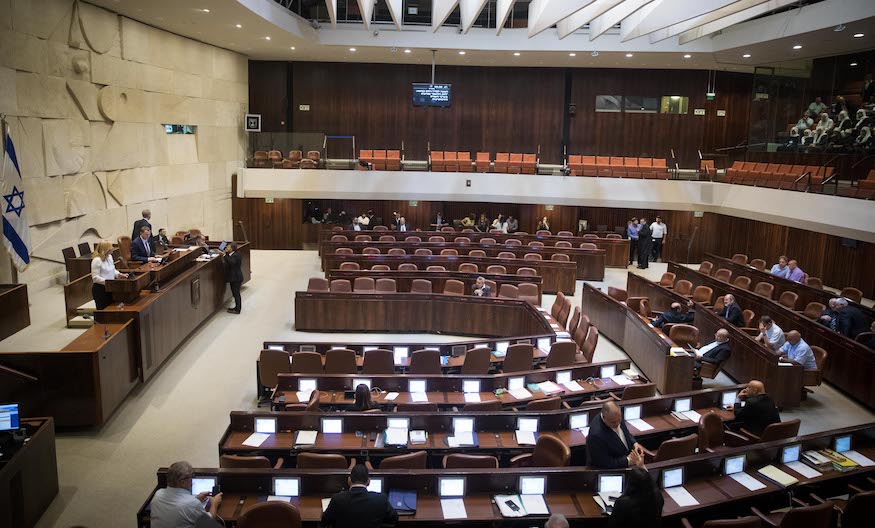Is Israel an ‘Apartheid’ State?
The Bible states that the Lord will bring the Jewish people back to the land and re-establish them as a nation in the ‘last days’ (Micah 4:1-7). We are surely seeing the fulfilment of that promise over the last 150 years.
The Jewish people are commanded to reclaim and resettle the wastelands, making them fruitful. But they no doubt also have a Biblical obligation to look after the other inhabitants of the land. The purpose of the return to the land is to give them a ‘new heart’ and put a ‘new Spirit’ in them – so that they will follow His decrees and keep His laws (Ezekiel 36). This surely includes compassion for the ‘strangers’ in the land (see, e.g. Deut. 14:28-29).
Reconciling these demands – possession of the land, and compassion to others – puts the Jewish people in a difficult position. Especially when having to defend themselves against those who are trying to annihilate them.
The controversial Nation-State Law recently passed by the Israeli Knesset has brought to the surface deep-lying differences of views within Israeli society itself about the spirit of Zionism and the nature of the Jewish State of Israel. At the same time, it has ignited hostile reactions from both Jews and non-Jews who object to the idea of an exclusively ‘Jewish’ State.
The law – a ‘Basic Law’ which has semi- constitutional status – goes a little beyond what is already contained in the Israeli Declaration of Independence and other Basic Laws. It lays down an exclusive relationship between the Jewish people, the State and the land of Israel: ‘The land of Israel is the historical homeland of the Jewish people, in which the State of Israel was established’; ‘the State of Israel is the national home of the Jewish people, in which it fulfils its natural, cultural, religious and historical right to self-determination’; and ‘the right to exercise national self- determination in the State of Israel is unique to the Jewish people.’
In a similar vein, it declares that ‘the state views the development of Jewish settlement as a national value and will act to encourage and promote its establishment and consolidation.’ It also makes Hebrew the single official language, relegating Arabic to a ‘special status.’
The law has been attacked by many as (yet another) attempt by the Jews to assert their supremacy over non-Jews in the land. Some say the law is further evidence that Israel is an ‘apartheid’ state. The head of the Israeli Arab Joint List group of parties in the Knesset, Ayman Odeh, denounced the law as ‘the death of our democracy’. According to Time Magazine, ‘be it making room for differences within Judaism or making room for minorities, Israel is looking a little less democratic by the day.’
Unfortunately, it seems the government under-estimated the backlash the law would create within Israel. Perhaps most painful was the complaint of discrimination by the 130,000-strong Druze community in Israel – who support the self-determination of the Jewish people, serve in the IDF and have contributed a lot to the establishment and growth of the State of Israel.
The preparation of the law was chaotic and its enactment a public relations nightmare. It is a great pity the government did not get the support of the Druze and other minorities prior to the law’s enactment. And, from a diplomatic perspective, it may have been wise to have included– as many had suggested – at least a symbolic re-affirmation of Israel’s commitment to democratic principles and equal rights of all citizens.
Israel is definitely not an ‘apartheid’ state
But while the law may have its shortcomings, Israel is definitely not an ‘apartheid’ state. Israel ranks consistently as one of the most open and democratic countries in the world in Freedom House rankings. The law does nothing to limit the civil rights of non-Jews. For Arabs to accuse Israel of apartheid is the height of hypocrisy.
The nationalist language of the law and of some Israeli leaders may seem provocative. But we should appreciate the context. The PLO, Hamas and many Arab nations refuse to accept the right of the Jewish people to exist as a nation. Some intend to annihilate it. And a majority of nations in the world want to force Israel into borders that are arguably indefensible in such a hostile environment (the ‘1967 lines’). It is hardly surprising that the Jews feel the need to assert themselves.
The right of peoples to self-determination in a specific geographical territory, is an accepted principle of international law and a core value of the United Nations Charter
The right of peoples (including the Jewish people) to self-determination in a specific geographical territory, is an accepted principle of international law and a core value of the United Nations Charter. Without that principle, most states would not exist. And, with the exception of Islamic/Arab countries, the international community has always accepted the right of Israel to be a Jewish state (for example, the UN Partition Plan of November 1947 proposed the creation of a ‘Jewish’ and an ‘Arab’ State).
Every well-developed democracy struggles to manage the tension between promotion of the values that underlie the state, and the human rights of all individuals and minority groups to equal treatment. Israel is no exception. The truth is, most non-Jews in Israel – Arabs, Christians, Druze, Bedouins, and others – much prefer to live in a democratic Jewish State of Israel (with all its imperfections) than an Islamic state in which minorities are definitely treated as second- or even third-class citizens.
Criticism of the Israeli government is fine, and the Nation-State Law is not immune from that. But we should also affirm the right of the Jewish people to exist as a nation in Israel, and appreciate the amazing contributions the Jewish people have made while fulfilling their difficult task of settling the land, and looking after the strangers in their midst.
Let us pray the Jewish people will look only to the Lord for guidance and that He will give them a ‘new heart’ and a ‘new Spirit’ – as He has promised. Then His Name will be glorified in the midst of the nations.






